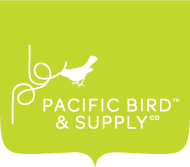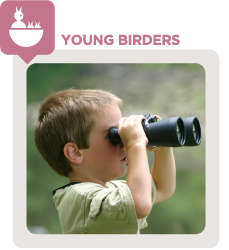

WHY ARE WILD BIRDS IMPORTANT?
Birds are very important in nature. In gardens, they eat insects that can harm plants. In the wild, they help spread seeds for trees and plants. Birds sense when their environment changes, so when birds leave an area it's often a sign of pollution or some other environmental damage. Ecologists track bird populations in order to detect ecological shifts before the problem spreads.
In addition, birds are beautiful to look at, a pleasure to listen to, and fun to watch. Bird watching is not only one of the most popular hobbies in the U.S., it's something everyone in the family can enjoy.
In addition, birds are beautiful to look at, a pleasure to listen to, and fun to watch. Bird watching is not only one of the most popular hobbies in the U.S., it's something everyone in the family can enjoy.
WHAT DO WILD BIRDS EAT?
Just like you eat different types of food to stay healthy and strong, so do wild birds. Most birds you see in your backyard eat a combination of insects, worms, seeds, nuts and fruit in order to keep in good health. Depending on the time of year, a bird has different dietary requirements. For example, in the spring and summer months, birds need lots of food to stay healthy and active to feed their young. And, during the winter, when the nights are long and the weather is colder, birds need fatty foods to help protect them from the low temperatures. However, people can provide nutritious foods to feeders all year to help our feathered friends stay healthy and happy.
WHAT CAN I DO TO HELP BIRDS STAY IN MY YARD?
There are many ways you can keep birds visiting your yard. Ask your parents about adding a bird feeder, a birdbath, or maybe ask if you can buy a birdhouse or build one as a project. Check out books on birds at your local library and see which birds live in your area. A little investigation will tell you what the birds that live near you like to eat and how to feed them. Birds are fascinating creatures that will visit your yard often with just a little encouragement.
WHAT IS BIRD CONSERVATION?
Bird conservation aims to protect and promote bird populations by preserving habitats where birds can find food and nesting areas. This can mean anything from keeping lakes, rivers, and coastlines clean, to keeping gardens free of pesticides.
What can you do to help? There are many things, but here are a few ideas:
• Ask your parents about making a bird habitat in your yard by adding a feeder and birdbath. Take responsibility to stock the bird feeder every day and make sure the birdbath has clean water. Feed the birds at the same time every day. Make sure the birdbath is full and the water is ice-free in the winter. How many different types of birds do you see visiting your bird-friendly yard?
• If you have a cat, ask if he or she can stay indoors. Birds and cats don't get along, and while birds eat and bathe, cats could sneak up on them.
• Ask your parents if you can make something to hang on the outside of windows to help flying birds. Sometimes they can't tell when they're too close to the house and they crash into the glass. Do research at your local library or online to find out how to make a Bird Saver by changing what a bird sees in the window glass.
• If you're old enough, ask your parent, guardian, teacher, or scout leader about taking part in a bird count. You'll enjoy a day outside, meet interesting people and see some amazing birds. Plus, you'll be helping scientists learn more about the environment.
• Take an interest. Find out about your local birds and try to make your yard a place where birds are safe and happy. Read about birds. Choose a bird species you like and do research for a school paper or project to make others aware of how special birds are and of the problems they face. If you're old enough, join organizations like the National Audubon Society (http://www.audubon.org) or Bird Conservation Research, Inc. (www.birdconservationresearch.org/) to find out what is being done to protect and expand bird habitats. Then, share the information with a friend, or with your class.
Make a pleasant and safe environment for birds, and they will reward you with the joy of song and natural beauty!
What can you do to help? There are many things, but here are a few ideas:
• Ask your parents about making a bird habitat in your yard by adding a feeder and birdbath. Take responsibility to stock the bird feeder every day and make sure the birdbath has clean water. Feed the birds at the same time every day. Make sure the birdbath is full and the water is ice-free in the winter. How many different types of birds do you see visiting your bird-friendly yard?
• If you have a cat, ask if he or she can stay indoors. Birds and cats don't get along, and while birds eat and bathe, cats could sneak up on them.
• Ask your parents if you can make something to hang on the outside of windows to help flying birds. Sometimes they can't tell when they're too close to the house and they crash into the glass. Do research at your local library or online to find out how to make a Bird Saver by changing what a bird sees in the window glass.
• If you're old enough, ask your parent, guardian, teacher, or scout leader about taking part in a bird count. You'll enjoy a day outside, meet interesting people and see some amazing birds. Plus, you'll be helping scientists learn more about the environment.
• Take an interest. Find out about your local birds and try to make your yard a place where birds are safe and happy. Read about birds. Choose a bird species you like and do research for a school paper or project to make others aware of how special birds are and of the problems they face. If you're old enough, join organizations like the National Audubon Society (http://www.audubon.org) or Bird Conservation Research, Inc. (www.birdconservationresearch.org/) to find out what is being done to protect and expand bird habitats. Then, share the information with a friend, or with your class.
Make a pleasant and safe environment for birds, and they will reward you with the joy of song and natural beauty!








